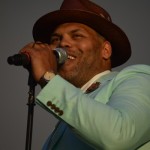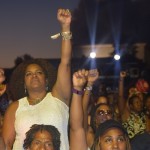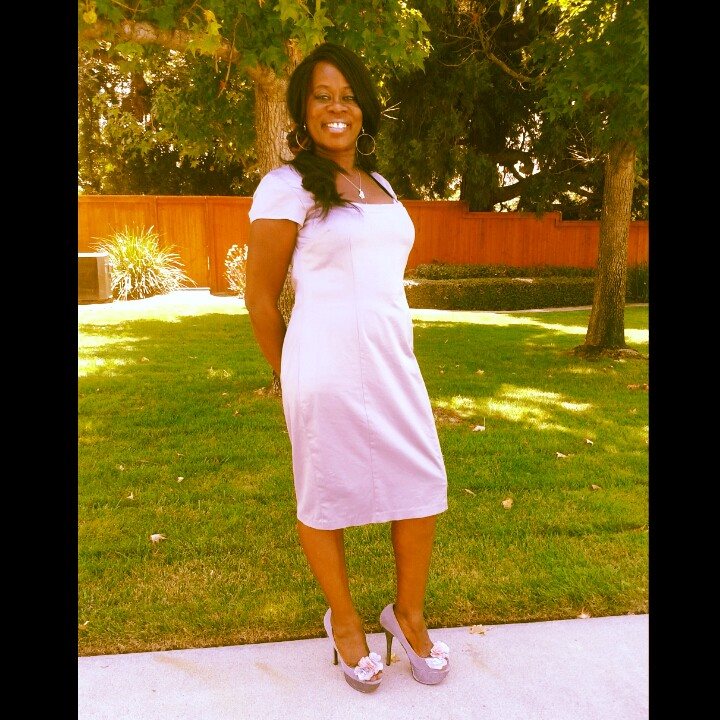NATIONWIDE- Reacting to the most recent wave of shootings of Black men by police officers, thousands of African-American consumers across America are directing their dollars by opening checking and savings accounts in Black-owned banks.
A grassroots effort being called a “Spend Movement” found the nation’s Black banks receiving calls and on-line requests to open accounts.
According to National Bankers Association President Michael Grant, “This is a movement that began over 100 years ago but had become dormant as a consequence of racial integration. Thousands have been mobilized to protest with their spending power. Many African-American consumers are linking the shootings with a sense of powerlessness, feeling undervalued and disrespected.”
Many African-American bankers are hearing that Black lives do not seem to matter because less value is placed on the lives of Black people as a group in America.
Since Friday, July 8, literally thousands of checking and savings accounts have been opened at Black-owned banks.
“The Black lives matter movement is a complement to an emerging economic empowerment movement that is engulfing Black communities all over America,” stated Preston Pinkett, NBA Chairman and CEO of City National Bank, headquartered in Newark, N.J.
Hoping to manage the expectations of its expanding customer base, Black bankers are encouraging some of their prospective customers who have lost their check-writing privileges to work with bank employees to correct the situation. But the banks are also cautioning customers not to become frustrated if the bank is unable to immediately extend check- writing privileges because of past mistakes by customers.
Grant also cautioned Black consumers to be mindful of the voluminous requests that the banks are receiving on-line, in person and by telephone. He stated: “This is a very positive development for Black banks. They have always provided a disproportionate share of the small business loans and consumer loans to African-Americans. Ironically, it seems that we have gone full circle back to where we were before desegregation. The Black community is turning inward and seeking to provide security for itself. And few would argue against the notion that nearly every major social issue plaguing Black people in America can find its roots in economic deprivation.
The National Bankers Association, founded in 1927, is a consortium of African-American, Hispanic, Asian, Native American and women-owned banks. The organization is headquartered in Washington, D.C.
The following is a listing of all NBA banks:
ALABAMA
Commonwealth National Bank
P. O. Box 2326
Mobile, AL 36652
(251) 476-5938, X105
(251) 476-9488 Fax
REGION I – African-American
Neill W. Wright
President
Liberty Bank and Trust
660 Adams Avenue
Montgomery, AL 36104
(334) 262- 0800
(334) 262- 0838 Fax
nwright@libertybank.net
REGION I – African-American
CALIFORNIA
William Lu
President & CEO
Saigon National Bank
15606 Brookhurst Street
Westminster, CA 92262
(714) 338-8700
(714) 338-8730 Fax
blu@SaigonNational.com
REGION V-Asian-Vietnamese
Kevin Cohee
President / CEO
OneUnited Bank
3863 Crenshaw Blvd.
Los Angeles, CA 90016
kcohee@oneunited.com
REGION V – African-American
Robert Lussier
President & CEO
Trans Pacific National Bank
55 Second Street, Suite 100
San Francisco, CA 94105
(415) 543-1052
(415) 543-3377 Fax
rlussier@tpnb.com
REGION V – WOB
DISTRICT OF COLUMBIA
B. Doyle Mitchell, Jr.
President & CEO
Industrial Bank
4812 Georgia Avenue, NW
Washington, DC 20011
(202) 722-2014
(202) 722-2040 Fax
dmitchell@industrial-bank.com
REGION II – African-American
FLORIDA
Kevin Cohee
President / CEO
OneUnited Bank
3275 NW 79th St.
Miami, FL 33147
kcohee@oneunited.com
REGION I – African-American
GEORGIA
Cynthia Day
President & CEO
Citizens Trust Bank
75 Piedmont Avenue
Atlanta, GA 30303
(404) 575-8300
(404) 575-8311 Fax
Cynthia.Day@CTBATL.com
REGION I – African-American
Robert E. James
President
Carver State Bank
P. O. Box 2769
Savannah, GA 31402
(912) 233-9971
(912) 232-8666 Fax
RJames@carverstatebank.com
REGION I – African-American
KANSAS
Sachitra Padamabhan
Chairman & President
CBW Bank
P. O. Box 287
Weir, KS 66781
(620) 396-8221
(620) 396-8402 FAX
suchitra@cbwbank.com
REGION III-Asian
Alden J. McDonald
President & CEO
Liberty Bank & Trust
1314 N. 5th
Kansas City, KS 66101
913-321-7200
ajmcdonald@libertybank.net
REGION III – African-American
KENTUCKY
Pedro A. Bryant
Chairman, President & CEO
Metro Bank
900 S. 12th St.
Louisville, KY 40210
(502) 775-4553
(502) 775-5323 FAX
pedrob@metrobankky.com
REGION III – African-American
ILLINOIS
Alden J. McDonald, Jr.
President
Liberty Bank & Trust Co.
1111 S. Homan Avenue
Chicago, IL 60624
(773) 533-6900, X239
(773) 533-8512 Fax
ajmcdonald@libertybank.net
REGION III – African-American
Seaway Bank & Trust Company
645 East 87th Street
Chicago, IL 60619
(773) 487-4800
(773) 487-0452 Fax
execdesk@seawaybank.us
REGION III – African-American
Frank Wang
President
International Bank of Chicago
1860 North Mannheim Road
Stone Park, IL 60165
(708) 410-2899
(708) 410-2696 Fax
Robert.Klamp@INBK.com
REGION III – Asian
LOUISIANA
Alden J. McDonald, Jr.
President & CEO
Liberty Bank & Trust Company
P. O. Box 60131
New Orleans, LA 70160
(504) 240-5161
(504) 240-5166 Fax
ajmcdonald@libertybank.net
REGION I – African-American
MARYLAND
Joseph Haskins
Chairman & CEO
The Harbor Bank of Maryland
25 West Fayette Street
Baltimore, MD 21202
(410) 528-1882
(410) 951-1858 Fax
jhaskins@theharborbank.com
REGION II – African-American
MASSACHUSETTS
Kevin Cohee
Chairman & CEO
OneUnited Bank
100 Franklin Street, Suite 600
Boston, MA 02110
(617) 457-4400
(617) 457-4435 Fax
kcohee@oneunited.com
REGION II – African-American
MICHIGAN
Barry Clay
President & CEO
First Independence Bank
44 Michigan Avenue
Detroit, MI 48226
(313) 256-8466
(313) 256-8811 Fax
bclay@firstindependence.com
REGION III – African-American
Alden J. McDonald
President & CEO
Liberty Bank & Trust
9108 Woodward Ave.
Detroit, MI 48202
313-873-3310
ajmcdonald@libertybank.net
REGION III – African-American
MISSISSIPPI
Alden J. McDonald
President & CEO
Liberty Bank & Trust
2325 Livingston Rd.
Jackson, MS 39201
(601) 987-6730
ajmcdonald@libertybank.net
REGION I – African-American
MISSOURI
Alden J. McDonald
President & CEO
Liberty Bank & Trust
1670 E. 63rd St.
Kansas City, MO 64110
(816) 822-8560
ajmcdonald@libertybank.net
REGION I – African-American
NEW JERSEY
Preston Pinkett III
President & CEO
City National Bank of New Jersey
900 Broad Street
Newark, NJ 07102
(973) 624-0865
(973) 624-1879 Fax
ppinkett@citynatbank.com
REGION II – African-American
NEW YORK
Preston Pinkett III
President & CEO
City National Bank of New Jersey
382 W. 125th St.
New York, NY 10027
(212) 865-4763
ppinkett@citynatbank.com
REGION II – African-American
NORTH CAROLINA
James H. Sills III President & CEO
Mechanics & Farmers Bank
P. O. Box 1932
Durham, N. C. 27702
(919) 687-7800,X-816
(910) 687-7821 FAX
Jim.Sills@mfbonline.com
REGION I – African-American
OKLAHOMA
Steve Riff
President & CEO
First State Bank of Porter
P. O. Box 250
Locust Grove, OK 74352
(918) 479-5001
(918) 483-3362 Fax
steveriff@valornet.com
REGION I – Native American
PENNSYLVANIA
Evelyn F. Smalls
President & CEO
United Bank of Philadelphia
30 S. 15th Street, 12th Floor
Philadelphia, PA 19102
(215) 351-4600 X105
(215) 231-3673 Fax
esmalls@unitedbankofphiladelphia.com
REGION II – African-American
SOUTH CAROLINA
John Kreighbaum
President and CEO
South Carolina Community Bank
P. O. Box 425
1545 Sumter Street
Columbia, S.C. 29202
(803) 733-8100, X1104
(803) 254-0150 Fax
REGION I – African-American
TENNESSEE
Deborah A. Cole
President & CEO
Citizens Bank
1917 Heiman Street
Nashville, TN 37208
(615) 327-9787
(615) 329-4843 Fax
dcole@bankcbn.com
REGION I – African-American
Jesse Turner, Jr.
President & CEO
Tri-State Bank of Memphis
180 S. Main
P. O. Box 2007
Memphis, TN 38101
(901) 525-0384
(901) 526-8608 Fax
lshaw@tristatebank.com
REGION I – African-American
TEXAS
Ignacio Urrabazo, Jr.
President
Commerce Bank
5800 San Dario Street
Laredo, TX 78041
(956) 724-2424
(956) 728-8247
iurrabazo@ibc.com
REGION IV – Hispanic
John Scroggins
President & CEO
Unity National Bank
2602 Blodgett Street
Houston, TX 77004
(713) 387-7401
(713) 387-5040 Fax
jscroggins@unitybanktexas.com
REGION IV – African-American
Nativido Lozano III
Vice President
International Bank of Commerce
P. O. Drawer 1359
1200 San Bernardo Avenue
Laredo, TX 78040
(956) 722-7611
(956) 726-6692 Fax
nlozano@ibc.com
REGION IV – Hispanic
Lee Reed
Sr. Vice President
International Bank of Commerce
1600 Ruben Torres Blvd.
Brownsville, TX 78526
(956) 547-1019
(956) 547-1029 Fax
lreed@ibc.com
REGION IV – Hispanic
VIRGINIA
Kelvin G. Perry
President
First State Bank
PO Box 6400,201 N. Union Street
Danville, VA 24541
(434) 792-0198
(434) 792-4978 Fax
Kperry@efirststatebank.com
REGION II – African-American
WISCONSIN
Seaway Bank & Trust Company
645 East 87th Street
Chicago, IL 60619
(773) 487-4800
(773) 487-0452 Fax
execdesk@seawaybank.us
REGION III – African-American
 Westside Story Newspaper – Online The News of The Empire – Sharing the Quest for Excellence
Westside Story Newspaper – Online The News of The Empire – Sharing the Quest for Excellence



















